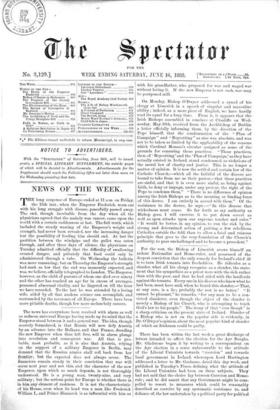For the rest, the Bishop of Limerick avows himself an
ardent Nationalist and Home-ruler, and possessed of the deepest conviction that the only remedy for Ireland's chief ill is to turn Irish tenants into freeholders. He ridicules as a slander, what all his clergy recognise as a slander, the state- ment that his sympathies as a priest were with the rich rather than with the poor, and that he had sided with the landlords against the tenants. Every one in his diocese who knew what he had been, must have said, when he heard this slander,—' That, at any rate, is a lie; probably the rest is no better.' "It cannot be pleasant," he remarks, "for any man to be a con- victed slanderer, even though the object of the slander is merely a Bishop of his Church, who is attempting to teach God's law to his people?' The irony of that "even though" is a sharp criticism on the present state of Ireland. Slander of a Bishop who is not on the popular side is evidently, in Dr. O'Dwyer's opinion, about the most popular kind of slander of which an Irishman could be guilty.


































